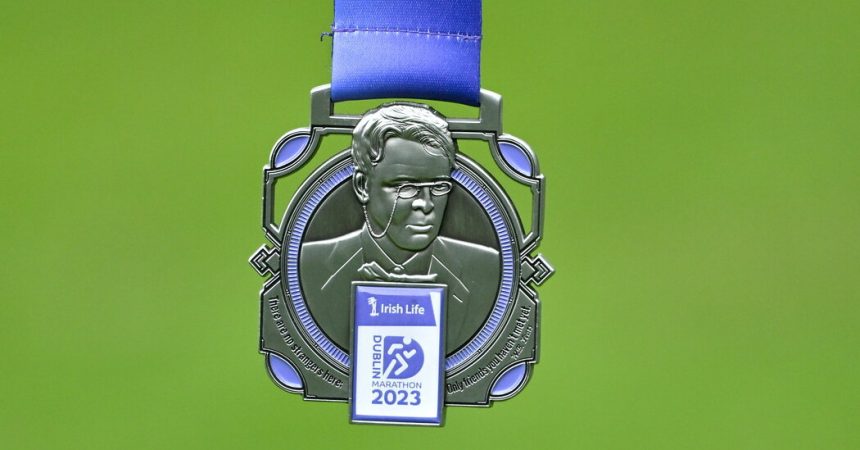Those who complete this year’s Irish Life Dublin Marathon will come away from the race with a number of rewards: The satisfaction of having trained for and accomplished a 26.2 mile run, the relief of being finished — and a prize medal commemorating the Irish poet William Butler Yeats.
But on that medal, beneath an image of the author and the race’s logo, is a quote that it turns out Yeats may have never said or written: “There are no strangers here; only friends you haven’t met yet.”
Ahead of the race on Oct. 29, the event’s organizers shared an image on social media last week of the participation medals, which honor the 100th anniversary of Yeats’s Nobel Prize in Literature. The quote curves around the bottom edges of the medal.
While the message is befitting of a marathon, where people come from all over to run together toward a common goal, online commenters were quick to ask: Did Yeats really say that?
In this case, the attribution cannot hold.
Though the quote is widely attributed to Yeats online, there is no record of him having ever written or said the line, said Susan O’Keeffe, the director of the Yeats Society Sligo in Sligo, Ireland. It’s unclear how or when the line came to be associated with the poet, because “all sorts of things get attributed to all sorts of writers, which is one of those issues that arises” in research, she said.
“The thing about Yeats that’s worth bearing in mind is that an awful lot of his letters and his articles and his essays were kept,” Ms. O’Keeffe said. There are scholars who dedicate decades to studying the poet; with all of that, it can be “pretty definitive” that there is no evidence of attribution.
But, she added, the message is appropriate for the event. The organizers “set out to do a good thing, and they have done a good thing,” she said.
The organizers of the Dublin Marathon, which was established in 1980 and is sold out this year with 22,500 runners, have over the years used the medal design as a way to commemorate prominent figures who have contributed to Irish society.
Some of the commentary this year has centered on “the view that this quote has never definitively been proven to be Yeats,” said Sinéad Galvin, a spokeswoman for the marathon. “The sentiment, however, still stands.”
Yeats, who was a prominent figure in the Irish literary movement, remains widely studied and cited — a phrase from his poem “The Second Coming,” for example, inspired the title for Joan Didion’s essay collection “Slouching Towards Bethlehem.” In 1923, he received the Nobel Prize in Literature “for his always inspired poetry, which in a highly artistic form gives expression to the spirit of a whole nation.”
The quote on the medal “was chosen as it embodies the values of the Irish Life Dublin Marathon,” Ms. Galvin said. “There is an incredible camaraderie amongst the runners on marathon day,” she said, and one of the intentions is to celebrate Yeats.
As far as any research can tell, he was not a known runner. “His eyesight was very poor, so that might have stopped him,” Ms. O’Keeffe said.
Even though the poet probably did not come up with the words himself, Ms. O’Keeffe said she believed he would have enjoyed the story and agreed with the intended message.
“Twenty-two thousand people will be taking Yeats home with them at the end of a run,” Ms. O’Keeffe said. “It’s fantastic — the sentiment couldn’t have been better.”









